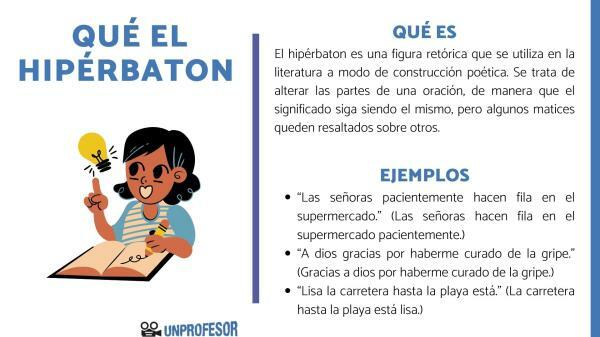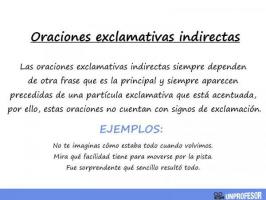What is HYPERBATON in literature

Surely you have seen that, in poetry, some sentences have the altered order, so that they can end the rhyme that the author needs, or simply to find the beauty of the construction. We call this literary figure hyperbaton.
In this lesson from a PROFESSOR we want to explain what is hyperbaton in literature and examples so you can understand it in a more practical way.
the hyperbaton is a Figure of speech used in literature as a poetic construction. Is about alter the parts of a sentence, so that the meaning remains the same, but some nuances stand out over others.
The first times it appears are in the XV century, since it is used as an imitation of the scheme that Latin follows. The word, as such, comes from the Latin hyperbaton, which was derived from the Greek ὑπερβατόν (hyperbaton).
The hyperbaton is a language resource that is closely linked to literature, especially poetry, since that is where it is most used. This word order always seeks beauty, expressiveness and emotion. In addition, it also brings a certain strangeness and
depth to the text, leaving the reader intrigued and making an effort to understand what the author is referring to.For example: "Your kisses and your tears I had in my mouth"
This part of the poem Daisy flower of the well-known author Ruben Dario shows us a very clear hyperbaton. The natural order of the sentence would be "I had your kisses and your tears in my mouth." However, the poet decides to change the order of the sentence to give it more emotionality and drama.
As we have mentioned before, this resource is also used to adjust verses to meter, rhythm, and rhyme they need to have, within a poem. In this way you get move the accent to the place where the author is interested, to get a good rhythm, put the final syllable so that it rhymes with the previous ones or make some sign to adjust the syllables of the verse.

In order to understand how the hyperbaton works and thus know how to imitate it in your compositions, it is good that you can see some practical examples. we leave you with some examples of hyperbaton. In parentheses, after the sentence with hyperbaton, we have written the sentence as we would build it in common language, so you can see the difference:
- "The ladies patiently line up at the supermarket." (The ladies line up patiently at the supermarket.)
- “Thank God for curing me of the flu.” (Thank God for curing me of the flu.)
- “Smooth the road to the beach is.” (The road to the beach is smooth.)
- "Slowly, the thief approached the lady who was leaving the bank." (The thief approached the lady who was leaving the bank slowly.)
- “The neighborhood you live in is dangerous.” (The neighborhood you live in is dangerous.)
- "I don't subscribe to that idea either." (I don't subscribe to that idea either.)
- “Test you can. Now, if it doesn't work, it's not going to be our fault." (You can try. Now, if it doesn't work, it's not going to be our fault.)
- "Your clothing store, many kilometers away." (Many kilometers away is his clothing store.)
- "The student is about to pass a few hours before his exam." (The student is a few hours away from passing his exam.)
- "Easy to approach this matter with you is." (It is easy to broach this matter with you.)
- “I was out of ideas after the last project.” (I ran out of ideas after the last project.)
- "The bird in that tree was whistling last night." (The bird was whistling in that tree last night.)
- “I am stunned by this whole story.” (I was stunned by this whole story.)
- "Bella is your new home in the country." (Your new house in the country is beautiful.)
- “Comfortable is this leather chair.” (This leather chair is comfortable.)
- "God does not wish it so." (God forbid.)
- "The films of this French director are captivating." (The films of this French director are captivating.)
- “His performance of him brought tears to everyone in the theater.” (He made everyone in the theater cry with his performance.)
- “You complain too much already.” (You already complain too much.)
- "I hear pretty well." (I hear quite well).
- "The dark swallows will return to hang their nests on your balcony." Gustavo Adolfo Becquer. (The dark swallows will hang their nests on your balcony again)
Now you know what is hyperbaton in literature and why poets used it. If you are interested in continuing to learn more about this topic or something similar, do not hesitate to consult our writing section, where we will give you all the tools you need to become a true poet.

Garrido, J. R. (1988). Espinosa Medrano's comments on the Gongorine hyperbaton. Lexis, 12(2), 125-138.
de Fignoni, N. m. (2011). The hiperbatón, a point of relationship between grammar and rhetoric. rhetor, 1(1), 43-58.


